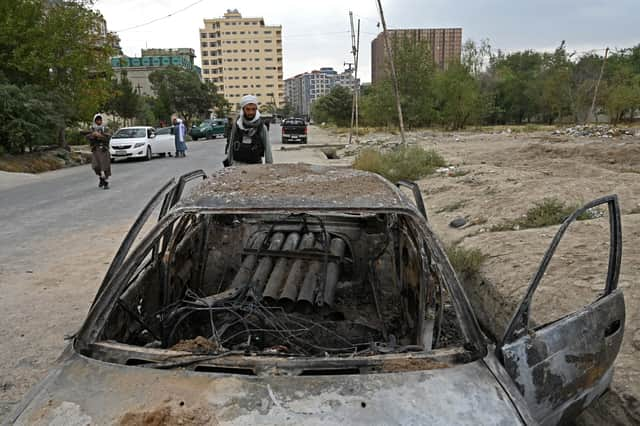Afghanistan: Birmingham City University security expert analyses the Taliban return


A Security Studies academic at Birmingham City University has suggested the UK Government will be prepare for potential terror attacks on home soil, following the Taliban’s return to power in Afghanistan.
Dr Lily Hamourtziadou, Senior Lecturer in Criminology and Security Studies at the university, said the Taliban are likely to explore alliances with China, Pakistan and Russia, following the withdrawal of US troops in the Central and South Asia state.
Advertisement
Hide AdAdvertisement
Hide AdDr Hamourtziadou said: “The war in Afghanistan, now nearly 20 years old, has so far cost the lives of over 71,300 civilians, according to Brown University’s Costs of War project. Afghanistan was the first casualty of the War on Terror declared by US President George W. Bush in the wake of the 9/11 attacks in America. Civilians have died as a result of violence perpetrated by Taliban fighters, international forces and successive governments of Afghanistan. They include thousands of children.
“Meanwhile, Afghanistan’s brutal Taliban regime was removed and the country became a democracy.
“The Taliban’s return to power signals the end of any hope of a viable democracy for the Afghans, and the start of new alliances between the Taliban and China, Pakistan and Russia, the strengthening of terrorist groups and the return to human rights abuses the Taliban were famous for.”
What will the UK Government do now
Dr Hamourtziadou said the Government could look to ‘tightening security at home’ in the event of a new terror attack and remote warfare using drones, if or when UK interests are threatened.
Advertisement
Hide AdAdvertisement
Hide AdShe added: “The conflict in Afghanistan never ended, but this new development plunges the country into further depths of oppression, violence and human rights abuses. As civilians try to flee the country, another humanitarian crisis spills over the border to the region and to the rest of the world.”
Why did the US withdraw from Afghanistan
The Doha Agreement, also known as the Agreement for Bringing Peace to Afghanistan, was a peace agreement signed between the United States and the Taliban in February 2020, to bring the Afghanistan War to an end.
The agreement essentially facilitated the withdrawal of US forces from Afghanistan in exchange for a Taliban pledge to prevent al-Qaeda from operating in areas under Taliban control.
The Afghan government was not a party to the deal and rejected its terms.
Advertisement
Hide AdAdvertisement
Hide AdAs part of the accord, the Trump administration agreed to reduce the amount of its troops present in Afghanistan by over a third within 135 days.
This time scale gave the US a July 2020 deadline, and America also pledged to closing five of its military bases if the Taliban kept its commitments.
The agreement also saw America commit to a full withdrawal of its forces within 14 months - i.e. by 1 May 2021.
However, the agreement met its first bump in the road when the US House Armed Services Committee overwhelmingly voted in favour of an amendment to the National Defence Authorisation Act.
Advertisement
Hide AdAdvertisement
Hide AdThe amendment restricted President Trump’s ability to withdraw US troops from Afghanistan below the previously agreed figure, as high levels of violence still persisted in the country.
This effectively slowed withdrawal efforts, and at the time of Joe Biden’s inauguration in January 2021, there were 2,500 US soldiers still in Afghanistan.
National security adviser Jake Sullivan said that the administration would review the withdrawal agreement, and in April, the Biden administration said it would withdraw the remaining soldiers by 11 September.
What happened next?
In May 2021, the Taliban and militant groups allied to it began a widespread offensive, coinciding with the withdrawal of most US troops from Afghanistan.
Advertisement
Hide AdAdvertisement
Hide AdJust a couple of months later, US intelligence concluded that the government of Afghanistan could collapse between six to 12 months after the departure of American troops.
Comment Guidelines
National World encourages reader discussion on our stories. User feedback, insights and back-and-forth exchanges add a rich layer of context to reporting. Please review our Community Guidelines before commenting.
